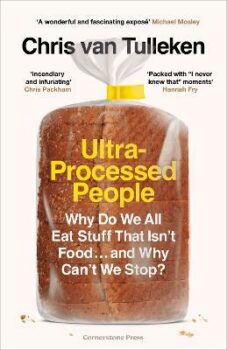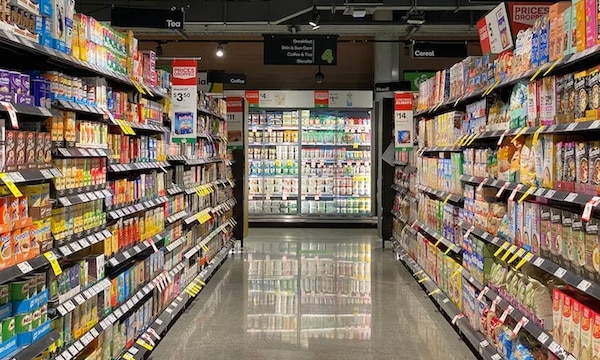Review of Ultra-Processed People: Why Do We All Eat Stuff That Isn’t Food … and Why Can’t We Stop? By Chris van Tulleken. Cornerstone Press; 384 pages.

Ultra-Processed People: Why Do We All Eat Stuff That Isn’t Food … and Why Can’t We Stop? By Chris van Tulleken
The maiden voyage of the Terra Grande, also known as Nestlé Até Você a Bordo (Nestlé takes you on board), set sail from the Brazilian port city of Belém in July 2010. The barge was described as a “floating supermarket” as it embarked on an eighteen-day circuit up the rivers of the Amazon lowlands, providing 800,000 people in impoverished riverside towns with the glories of the modern Western diet. The best-sellers were Kit-Kats, an 80-gram serving of which contains 38 grams of sugar.
The products rapidly infiltrated the communities. To compete, local stores began stocking the ultra-processed junk food peddled by Nestlé. In its wake, the Terra Grande left dietary chaos. High sugar, ultra-processed food became a core food group. Childhood obesity rates rose as high as 30 percent in some communities, and cases of Type 2 diabetes have since been reported in large numbers, a disease that was previously unheard of.
Nestlé complemented the floating supermarket with another program, Nestlé Até Você (Nestlé Comes to You), to better access Brazil’s urban slums. Seven thousand women were employed as door-to-door salespeople, and the program now visits 700,000 low-income households each month with its ultra-processed goodness. As one company supervisor put it:
The essence of our program is to reach the poor.
This story of a multinational food company destroying the health of impoverished populations is recounted in Chris Van Tulleken’s Ultra-Processed People. The book is an insightful scientific, political and economic look into capitalism’s global destruction of nutrition and health. It points the finger squarely at the profiteering multinationals and complicit governments, regulatory bodies and NGOs. Van Tulleken contends that the rise of “ultra-processed food” (UPF), defined as any food containing synthetic additives, has led to the deterioration of people’s health. Today, in Australia, the UK, the U.S. and Canada, UPF constitutes up to 60 percent of the average diet.
A tendency has emerged across the world over the last 50 years regarding health that contradicts the rest of human history. In most countries, the poorest people eat the most calories. They are also the most nutritionally malnourished. “Diet quality and associated health outcomes follow a social gradient in Australia, and internationally,” concluded a recent VicHealth study. In the UK, working-class children are getting shorter on average, at the same time that they are getting fatter. Rich children continue to grow.
From the 1950s onwards, savvy food companies figured out ever more novel ways of using additives and synthetic ingredients to mimic more expensive foods. Modified starches from potatoes or corn were far cheaper than dairy fats, and, once packed with bulking agents, flavouring and colouring, could appear close enough to the real thing. The cheapest forms of fats, proteins and carbohydrates could be processed in any number of ways to create a lucrative mass product. With added preservatives, food was much more suited to the logistics of the market. Beyond just reducing ingredient costs, these chemicals and methods of processing were used to “extend shelf life, facilitate centralised production and, as it turns out, drive excess consumption”, according to Van Tulleken. Excess consumption became increasingly central to the profitability of these products.
There are an estimated 10,000 additives in modern food production, according to a study published in the journal Comprehensive Reviews in Food Science and Food Safety: flavouring, colouring, foaming and anti-foaming agents, bulking and anti-bulking agents, preservatives, emulsifiers and gums, among many others. Some of these have known serious health effects, but the overwhelming majority haven’t been researched enough to determine their consequences conclusively. The average UK resident consumes eight kilograms of these substances a year.
These additives are also incredibly effective at subverting the body’s natural regulatory system. Van Tulleken writes about studies that have shown that, when infants are given full access to a variety of nutritious foods, they feed themselves a nutritionally balanced diet, without over-or under-eating. This indicates that the body’s regulation of nutritional intake is as sophisticated as that for temperature or blood pressure. But the rise of UPF has disrupted these processes.
For instance, a 2019 study by the U.S. National Institutes of Health found that even when UPF and unprocessed foods have identical nutritional profiles (in terms of calories, and macro and micronutrients), people will overeat the processed food.
According to Van Tulleken, there has been “an evolutionary selection process over many decades, whereby the products that are purchased and eaten in the greatest quantities are the ones that survive best in the market. To achieve this, they have evolved to subvert the systems in the body that regulate weight and many other functions”. That is, getting people addicted to calorie-dense, nutritionally lacking, additive-loaded products—to the immense detriment of their health—is the food industry’s main game.
Coca-Cola, for example, is packed full of sugar: ten teaspoons per can. To make it palatable (because spoonfuls of raw sugar don’t taste good) Coca-Cola adds bitter flavouring that cancels out some of the sweetness, so that consumers get the unnatural sugar and caffeine hit without their body rejecting it.
Like the quantity of additives in their products, the profits of these companies are immense. Nestlé, the biggest of them all, grossed US$45 billion last year, PepsiCo $46 billion, Mondalez $11 billion, Archer-Daniels-Midland $7.5 billion.
Van Tulleken makes a series of compelling arguments throughout the book regarding the social and economic factors behind the health crisis. He rejects the individualist, personal responsibility framework that dominates mainstream discussions of nutrition and health. The book is explicitly not a self-help guide.
He writes that, across the West,
there was a dramatic increase in obesity, beginning in the 1970s. The idea that there has been a simultaneous collapse in personal responsibility in both men and women across age and ethnic groups is not plausible.
Over the past 30 years, childhood obesity in England has increased by 700 percent, and severe obesity by 1,600 percent. This can be explained only by tectonic shifts in the diets made available.
In Australia, the number of people living with Type 2 diabetes has tripled (or doubled when adjusted for population growth and age structure) over the last twenty years, according to the Australian Institute of Health and Welfare. Comprehensive meta-analysis has demonstrated a conclusive link between UPF consumption and Type 2 diabetes. Multiple studies have indicated that higher consumption of UPF also leads to massively increased risks of heart attack and stroke.
Consistent with this structural approach, the book centres inequality as a major factor in health outcomes. The consumption of UPF is directly correlated with income, the poorest eating the most. This can largely be explained by pretty simple personal economics. In the UK, a study by the Food Foundation charity shows that the poorest half of the population would need to spend a third of their disposable income on food to meet the minimum nutritional guidelines. The bottom 10 percent would need to spend 75 percent. There are twice as many fast-food outlets in the poorer suburbs of England as in the richer, and advertising is most concentrated in those areas.
In Australia, age-standardised rates of Type 2 diabetes are more than twice as high in the lowest socioeconomic areas as in the highest. Van Tulleken makes the case that diet and access to quality food are major transmitters of the “health-wealth” gap, alongside smoking and access to health care.
The book also decries the crimes of the major food companies that get rich by destroying the health of billions. For instance, in the 1970s Nestlé was accused of getting mothers in sub-Saharan Africa hooked on free samples of baby formula to the point where they stopped lactating. Mothers were then compelled to purchase baby formula or have their children starve—which thousands of the poorest did.
In Ghana, one of the poorest countries in the world, obesity rates have risen from 2 percent to 13.6 percent since 1980, as fast-food outlets and UPF companies have expanded their territory. Former CEO of YUM!, KFC’s parent company, justified their intervention by saying:
It’s so much safer to eat at a KFC in Ghana, than it is to eat, obviously, you know, pretty much anywhere else.
The agricultural system that serves the modern food industry is equally as destructive. Brazilian rainforests are chopped down to grow soybeans, which are used to force-feed factory-raised animals and produce various proteins and fats in their cheapest forms. Indonesian peat forests are burned to clear land for palm oil production, generating thick blankets of smoke and unfathomable amounts of pollution. In 2015, the burning of these forests emitted more CO2 in just a couple of months than the entire German economy that year. Modern agriculture is one of the biggest contributors to global warming, fuelled by the demands of the industrial food sector.
There are broader dynamics at play than just the individual wickedness of CEOs. As Van Tulleken puts it, each company “is in an arms race with other companies … all vying for that real estate in the shops that maximises sales. If Kellogg’s decided to take a stand [by making their food healthier and less profitable], the space would instantly be filled by another product from another company”. The nutrition crisis is a built-in product of modern capitalism, stemming from its competitive economic structures.
In this way, Van Tulleken approaches an anti-capitalist perspective. He argues that “shame and outrage are clearly inadequate to limit the survival of companies that are complicit in atrocities” and “their behaviour only changes when the flow of the money is diverted”.
Van Tulleken also lacerates the useful idiots and the actively complicit of the health NGO world. He slams the growth of “healthwashing”, whereby the worst offenders of the obesity crisis fund research about the very crisis that they are causing. He puts it firmly:
Organisations that take money from, for example, Coca-Cola, and claim to be fighting obesity are simply extensions of the marketing division of Coca-Cola … the interests of [these companies] and those of obesity campaigners are not, and cannot be, aligned.
However, Van Tulleken stops short of the full-blooded anti-capitalism that is required really to tackle the systemic issues he describes so clearly. While rejecting regressive proposals, such as sugar taxes, he falls back on milquetoast technocratic solutions. His proposals for policies like limits on fast food advertising and better regulated health research to prevent corporate influence would be welcome, but will not even scratch the surface of the structural causes behind the obesity epidemic.
Elsewhere, Van Tulleken devolves into utopianism, arguing for a “fixing” of the agricultural system which today is based on monoculture crops, mass use of antibiotics and massive environmental destruction. But without a way to fight for such a system, the suggestions remain, as Marx put it 150 years ago, “recipes for the cookshops of the future”.
Ultimately, what Ultra-Processed People clearly demonstrates, but does not actually say, is that there is no solution to the health crisis under capitalism. For business, even the most essential of products, food, is just another way to make obscene amounts of money. The health of billions is sacrificed in the interest of profit.

